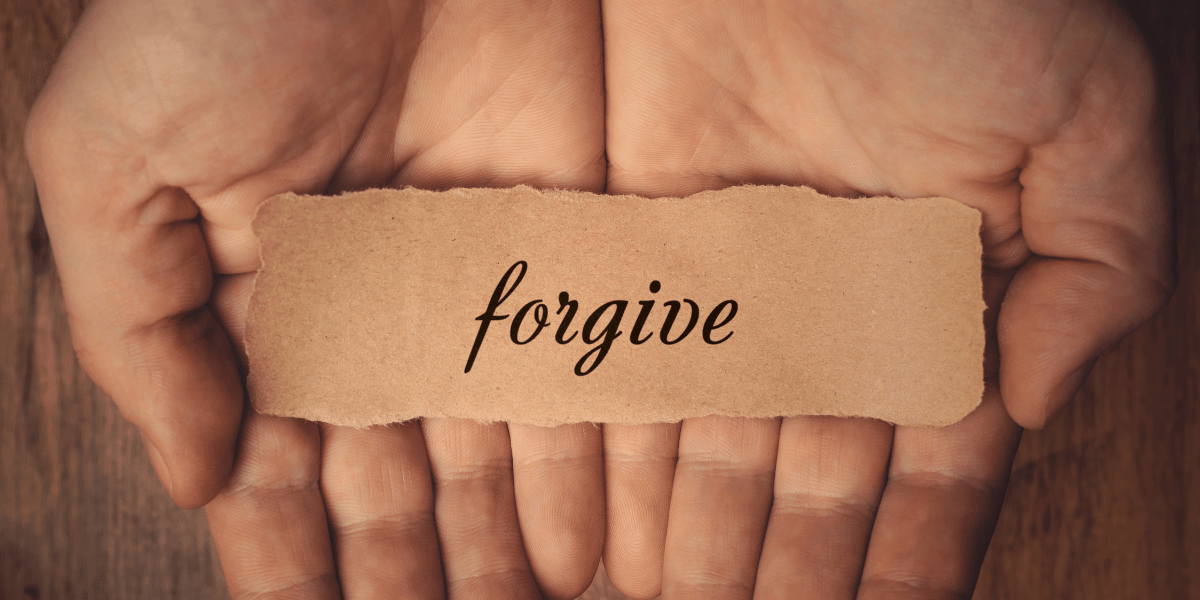What Forgiveness Can Teach Us About Creating a Thriving Life
Simple Superpowers Series, Part 3: Researchers have identified simple superpowers that help us flourish in our lives and relationships. In week 1 we looked at gratitude. Week 2 focused on curiosity. This Part 3 focuses on forgiveness – and it’s so crucial that we’ve broken it up into two separate posts. This week we focus on why forgiveness is essential. Come back next week for practical tips on why we resist forgiving others, and how to actually do it well.
What is something you do for others, that sets you free?
Forgiveness.
It’s a bit like a riddle, isn’t it? Most of us would say we absolutely, one hundred percent, cross-our-hearts-and-hope-to-die agree that forgiveness is important to us. But when it comes to actually forgiving … well, now I’m stepping on some toes.
Trust me, my toes hurt plenty.
I’ve had many opportunities to forgive and to seek forgiveness from others, and I haven’t always gotten either right. Maybe you haven’t either. I’ve heard heart-wrenching stories from many of you – situations in which even the most generous, loving person would find it challenging to forgive.
If I’m not careful, my mind can easily dredge up my own deep hurts. (Of course, my memory is somehow mysteriously blanking on those I have hurt!) My heart can turn to personal betrayals from those I trusted, and care about. Or even professional betrayals from other believers.
As one example, our ministry is still, today, living with the financial consequences of a ministry partner breaking agreements and walking away right before the launch of a joint venture Jeff and I had poured much time and money into. Every time my mind even wanders near that situation, I find a sense of tightness in my chest.
Guess what that means? I’m still working on forgiveness.
Yet even in betrayals, hurts, and hardships, we are commanded to forgive.
Why? And why should we even try?
There are many different reasons found in both scripture and science, and in a moment I’ll unpack a few fascinating findings from the research. But one reason is very clear across all of it:
Forgiveness is a superpower for thriving in life and relationships.
This week, let’s take a look at why that is, and why we should forgive. Next week, we will explore why we resist this amazing superpower, and how to actually forgive.
Why is forgiveness a superpower?
In this life we are 100% sure to be hurt by others. And without forgiveness, we are also 100% sure to be in a regular state of bitterness and anger. Research finds this is extremely damaging. In fact, some researchers are pushing for regular bitterness to be labeled an official medical disorder.
Forgiveness is the only action that can set us free and allow us to live a thriving life instead. Think about it: Even a subconscious decision to “just let it go” and not get furious at the driver who cut us off on the highway is a form of forgiveness.
The mindset and action of forgiveness in ongoing relationships is essential for building strong bonds, deeper intimacy, and relational depth. Our choice to forgive in a difficult situation is a true superpower for every area of life.
Now, let me explicitly state that forgiving someone who has continually or acutely betrayed or abused you is not the same thing as continuing to trust them.
Forgiveness does not require an ongoing relationship. And forgiveness doesn’t mean you have to somehow ignore your legitimate hurt or anger; indeed, processing those feelings is vital. But true forgiveness will set you free in your mind and heart even if you must create boundaries, step away from that relationship, or pursue consequences for someone’s actions.
So there is straightforward self-interest in choosing to forgive (and we’ll come back to that in a moment). But that is not the only reason to do it.
Why should we forgive? Because we have been forgiven.
I know readers of this blog come from all different perspectives of faith, or no faith at all. (Which, I would argue, is another type of faith. But I digress.) Yet the concept of forgiveness is central to the Christian faith for one very important reason.
As the Apostle Paul put it in his letter to the church in the ancient city of Ephesus, “Be kind and compassionate to one another, forgiving each other, just as in Christ God forgave you” (Ephesians 4:32 NIV, emphasis mine).
Our forgiveness of others is always tied to the fact that we have been radically forgiven for our hurts to others – and to God. If we were to dredge up our own mysteriously blank memories about all the ways we have really have damaged people – including the people we love the most – we would probably end up in despair. If we were to honestly catalogue the ways we have betrayed the heavenly Father who created us and loves us, we would see how unworthy we are of coming before His throne.
But, God. The cornerstone of the Christian faith is that Jesus died to pay the ransom for that sin. He defeated sin so that each of us could be forgiven for it. If we were to truly grasp how astounding that reality is, I suspect we would never withhold forgiveness.
For example, in the professional illustration I shared earlier … yes, the leaders of that partner group broke their agreement, and our ministry suffered as a result. But how many times have I, too, made hard decisions that were probably perceived as selfish and hurtful? If I truly grasp how much I have been forgiven, how can I not forgive fellow ministry leaders? We have all fallen short.
The benefits of forgiveness
Beyond the command to forgive, we should also be aware of the astounding benefits of doing so! There are so many studies that examine and quantify the positive effects of forgiveness on health and relationships. Here are just a few:
Forgiveness improves our health and overall wellness
The health impacts of forgiveness are better than any miracle medicine! With forgiveness, there is a lower risk of heart attack, lower depression and anxiety, and lower risk of major psychiatric disorders – among many other positive outcomes.
Simply put, forgiving leads to better living. One study found that children who forgive even do better academically! And Johns Hopkins finds forgiveness leads to more satisfaction in life overall.
Forgiveness helps our relationships
Forgiveness also holds special power in relationships. It’s a way of dislodging ourselves from hurt, resentment, or getting even – all of which are relationships killers. It resets a problem that’s been imprisoning us. Again, it sets us free.
Perhaps a friend betrayed a confidence or your spouse humiliated you in public. Those are hard things. We do get to say “ouch.” We can call out the offense. But withholding forgiveness keeps us in a place of being wounded. Over time, that can lead to:
- Staying stuck in a victim mentality
- Feeling superior (I would never do what they did)
- Feeling bitter
- Retaliating (I want them to hurt, too)
Forgiveness opens up the opposite possibilities! If navigated with goodwill and reciprocated with steps to restore trust, forgiveness can be a powerful glue that builds intimacy and strengthens a marriage or friendship bond into something much stronger than it was before.
Thankfully, we don’t have to do this forgiveness thing alone! One researcher looked at studies published in peer-reviewed journals between – get this – 1872 and 2010 and found that, statistically, people of faith are much better forgivers.
I’m sure one reason why is that God doesn’t just command us to forgive – He helps us to do so.
Check back next week to find out how.
If you are interested in having Shaunti bring research-based strategies, practical wisdom and biblical principles to your next event, please contact Nicole Owens at [email protected].
On our podcast, I Wish You Could Hear This, Jeff and I offer proven steps to help you thrive in your life, faith and relationships. In other words, we’ll offer the practical help you’ve grown accustomed to right here in this blog space. You’ll take away specific steps that help you today. Listen, follow, and share with your friends on YouTube, Apple Podcasts, Spotify and other platforms.
Please note: This post may contain affiliate links. As an Amazon Associate we earn a small amount from qualifying purchases through these affiliate links. This doesn’t cost you anything, and helps us continue bringing you great content!







